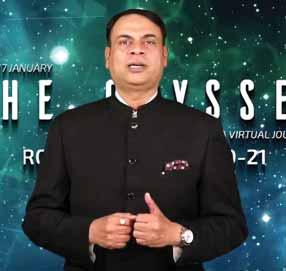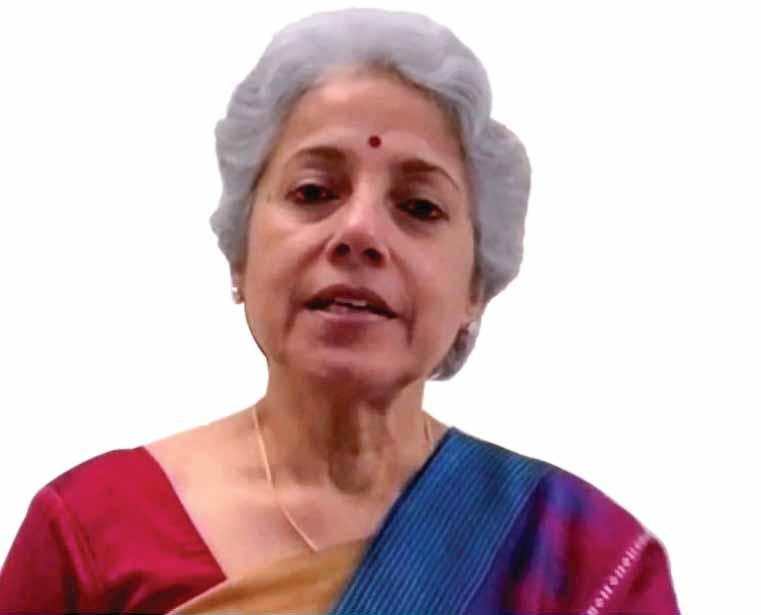
14 minute read
Time to upscale our performance
Time to “upscale our performance” Shekhar Mehta
Rasheeda Bhagat
Advertisement
Imiss shaking hands and exchanging warm hugs in picturesque Kochi, but in this new normal, this outstanding institute has been organised virtually. The human spirit has taken up the challenge of the Covid pandemic with resilience, grit, patience, discipline and above all, hope, which is a pline and above all, hope, which is a powerful thing. It inspires us to do powerful thing. It inspires us to do the impossible and helps us carry on the e impossible and helps p us s carr r y on during difficult times,” said RI during difficult times,” sai a d RI President Elect Shekhar President El E ec e t t Sh S ekh har Mehta, addressing Me M hta, ad ddressin ing the inaugural sesthe inaugural session of the RI zone sion of the RI IR zone institute. in nst ts it i ut te e.
He told particiHe H told d p part rtic cipants at the virtual pa p nts at a the e virt tu l al institute titled ‘The Odyssey’ that this hope was now turning into reality with several vaccines on the horizon, “created in record time against the biggest disaster that we’ve seen in our lifetime.” Urging Rotarians to celebrate the spirit of hope and humanity, Mehta said hope allows people to “survive, adapt and excel despite to “survive, adapt and excel desp adversities taking such a horrible toll adversities taking such a horrible t during this annus horribilis. For Rashi during this annus horribilis. For Ra and me, it has been a year best forgotand me, it has been a a year a bes se t t forg ten; between us we lost a dear ten n; be etwe een us we lost t a a d father and a mother. We lost fath her e a d nd a m t othe h r. We e l our dear Binotadi (wife of ou ur r de ear a Binotadi i (w wif fe PRIP Kalyan Banerjee) PR RIP P Kalyan n Ba an nerje and our special friend and our r special f frie Yash (PRID Y P Das).” Ya Yash h (PR RID I YP P Da as) s) Two of RI’s biggest T Two of o RI I’s b bigg g events — Convention and events — Conve ent n i io on a
RIPE Shekhar Mehta International Assembly — had to go virtual “denying thousands of Rotarians the joy of fellowship, networking and learning, and yet we look forward to a healthier world.”

Mehta announced that Rotarians “will do our best to help governments in the vaccination process.” In India, along with PRIP Rajendra Saboo, he and other Rotary leaders had met Union Health Minister Harshvardhan and the Niti Aayog leaders. Work had started at the grassroots in UP, Karnataka and other places, “where Rotary had been invited by these states as people with polio vaccination experience.”
He added that as Rotarians, “there is a lot that we can do to stop Covid. We can help in the distribution of vaccines, provide training and certification to vaccinators. We can provide our hospitals, blood banks, schools etc as vaccination centres and also help in social mobilisation, advocacy against vaccine resistance, etc.”
Mehta added: “Polio gave us a silver lining last year and with Africa declared polio-free we are this close to ending polio. The last leg of the marathon is most crucial and painful but the runner’s eyes are on the finishing line and not on the pain. Let us put our best foot forward and contribute to TRF for polio because our contributions
Rotarians can help in vaccine
distribution, provide training to
blood banks, schools etc as
vaccination centres and do advocacy
against vaccine resistance.
RIPE Shekhar Mehta
are multiplied by TRF and the Gates Foundation.”
The challenge of the pandemic had also made “us flexible nimble, more connected and nearly omnipresent. Like all of you, I too have zoomed across meetings, sometimes panning several continents, in just a single day. One particular day, I was in Africa, South America US, Europe and South Asia.”
He added that RC Delhi South West, RID 3011, has been organising for the 20 years a sit-and-draw competition. Last year they had 6,000 participants; this year at the virtual event which he participated in, over 12,000 children from 20 countries participated. The lessons learnt from the pandemic will now allow Rotarians to get the best from both the virtual and physical world. “Our speed to hold meetings and take decisions has increased considerably,” he said. The RI Board now meets every alternate month and the Trustees are “a shade better. They meet every month and quick decisions are now the outcome following the increasing ability to adapt.”
Thanking Rotarians for their generosity during the pandemic, he said that apart from a huge contribution to
connected and nearly omnipresent. Like al ll of you, I too have zoomed across m meetings, sometimes pannin ng g severa al l c continents, in just a singl le e day. O On ne e p particular day, I was in n Af fric ca a, Sou o th ht A America US, Europe e an nd South th Asia.”
He added that R RC Delh hi South h W West, RID 3011, has s been org ga an nis ising for the 20 years a si it-a and-draw w co ompetition. Last year r th hey had 6,0 000 0 par rticipants; this yea ar at th t e virtual l e even ent which he particip pated d in, ove er r 12,000 0 children from 20 countri r es pa arti ic cipate t d. The lessons learnt t from m th t e pa ap n nde em mi ic c will now allow Rot tarians to o ge et t t the best from both the e virtual and dn phy ysical world. “Our sp pee eed d to ho old d me m et tings and take deci is sions has in ncrease ed considerably,” he said. Th he e RI RI Boa ao rd d now meets every alternate m mo ont th h an nd d the Trustees are e “a a shad a e be ett t er r. Th hT ey y meet every mon nt th h and n qui iu ck k dec cis i io ons are now the outc t om o e e fo oll llow o in ing the increasing abilit ty y to ad dap pt. t ”
Thanking Rot tar a i ia an ns for the h i ir ge en nerosity during the e pan nd demic, he sa s id id that apart from m a hu huge e con ntr t ib bu utio oi n n to o the PM Cares Fund, “you have done immense work at the grassroots level, providing masks, sanitisers, medical equipment, food, etc, taking the combined worth of both to “nearly a value of $30 million in India including the contribution to the PM Cares Fund. And this did not impact our contribution to TRF. We reached our goal.”



The incoming RI president said last year the service projects done in our zones in all the Rotary’s areas of focus were outstanding. Whether it was tree plantation, solar projects, blood banks, dialysis centres, heart surgeries for children, or building rural toilets, WinS, etc, great work had been done. “I feel particularly proud of the work done by RILM. The nearly 1,500 hours of audio-visual content that we provided to the GoI is of outstanding quality according to the government itself. And the government’s numbers say that along with other content, it has got 400 million hits.”
While Rotary in Nepal and Pakistan was also adopting these programmes, “the GoI is now working with African nations and wants to help them with this and other additional content for learning.”
Saying that this pandemic “has given us the time and opportunity to sharpen our axe”, Mehta urged Rotarians to take up projects of much bigger size and far-reaching impact. “I take great pride in the service activities, growth and impact that Rotary is making in South Asia. Next I hope you will take up the challenge of ‘each one bring one’ in the next 18 months.”
Along with increasing membership, there was also need to set up more flexible clubs… satellite clubs, cause-based clubs etc. “The opportunities are great. In the past we have expanded our reach, now is the time to upscale our performance.”
He added: “Let our giving to TRF also go up like never before. Currently Trustee Chair K R Ravindran is from our zone, and from July 1, the RI president will be from our zone. We’ve
Institute convener RI director Kamal Sanghvi

always excelled in TRF giving during such times. Let’s do it once more with our focus also on annual and polio giving.”
Concluding on an optimistic note, he said that hope was the elixir of life. “It leads to innovation, discoveries and excellence. We have hope of a totally literate South Asia, hope of working with our governments to bring water, sanitation and empowerment to our communities, leading to the hope of peace in our world.”
In his opening speech, institute convener and RI director Kamal Sanghvi said for all the pain it had brought, the corona pandemic had also done some good. “We have started cleaning our houses and surroundings on a regular basis, and nature is healing and thanks to our minimised movement, has got a well-deserved break. Flamingoes have painted Mumbai pink and the Himalayas can now be seen from Jalandhar. Delhi has a clear blue sky. Family relationships have strengthened as this pandemic has impelled us to spend time with our families.”
Technology was an integral part of this new reality and had helped improve educational practices. Digitalisation of education was already under way “but this crisis has accelerated the transformation. And RILM has initiated perhaps the world’s largest online learning programme, along with the NCERT and the HRD ministry, benefitting nearly 15 crore children across in India.”
RILM had also launched a pilot skilling programmes titled Saksham Bharat to skill young adults with guaranteed employment. He announced that 51 young adults had graduated that very day with job placement, and “the next 100 will graduate shortly; during this year we want to skill 5,000 people under this programme.”
Sanghvi said virtual platforms had increased both meetings and connections. “The needs in the world are greater than ever before. It’s like climbing a steep mountain yet the mountain has to be climbed.” The institute team had traversed the unknown and created The Odyssey, bringing as speakers some of the world’s greatest “achievers, businessmen, thinkers, doers, speakers and deliberators; 14 CEOs, educators, environmentalists, lawyers, actors, poets, entertainers, and bankers will speak to us, to make this an institute of knowledge.”
Of course, he added, “there is no greater joy than finishing the race and the last hurdle for ending polio from the entire world still remains, but we will remove it and finish that race.”
In his welcome address, institute chair PDG Sanjay Khemka said that while it was a heartbreaking and tough call to move the institute from the “lush backwaters of Kerala to a virtual platform, we took that call and did it.”
As he pointed out, optimum use of the best technology had been made to give the participants a feel of entering an actual auditorium to listen to the speakers, and the visual effects were stunning. Khemka added that the delegates would get a flavour of Kerala through a gift hamper that was put together with products made with natural products by a group of disadvantaged women who had formed an organisation called Wild Ideas.
The institute also had virtual stalls and he urged the participants to visit them.
Covid has done some good too; we
clean our houses and surroundings
on a regular basis, and nature is
healing and got a well-deserved
break. Flamingoes have painted
Mumbai pink, the Himalayas can
be seen from Jalandhar and Delhi
has a clear blue sky.
RI Director Kamal Sanghvi Institute chair PDG Sanjay Khemka

The satisfaction of stepping up
Giving is more than an activity. It is a way of life and a beacon in the search for hope in troubled times. There is great turmoil today, but these are not unusual times, not in the span of human history. The wisdom of the ages is especially important to help us set our path and purpose.
Such wisdom comes from the 12th-century philosopher known as Maimonides. Born in Córdoba, Spain, he and his family went into exile in Morocco to escape religious persecution. As a young man, he mastered Aristotle, astronomy, and later medicine. After moving to Cairo, Maimonides became known as the city’s greatest rabbi, producing tomes of commentary on the Torah, and he lived out his final days as a renowned doctor.
But his greatest gift to humanity captured his thoughts about giving itself. His Eight Levels of Charity is a masterpiece that teaches us about what giving means and what motivates us to do it.
The bottom rung of Maimonides’ ladder is giving out of pity or grudgingly. The next step up is giving less than one should, but doing so cheerfully. Climb up to the fifth rung and you are giving before being asked. Further up the ladder is giving in a way that the receiver does not know who the giver is. The eighth and highest level of charity is to anticipate distress and giving to avoid or prevent it.
When we immunise children against polio, we are anticipating potential illness. We do so with other efforts, such as Rotary projects that reduce the incidence of malaria or cervical cancer.
When we teach someone a profession that enables them to earn a living, we apply the eighth step. From microfinance to education, The Rotary Foundation helps us give the gift of self-reliance.
All of this good work awaits us, as does the work of supporting newborns, cleaning water sources, recovering from the Covid-19 pandemic, and countless other efforts we lead.
I am proud to say that many Rotary members climb to the top of Maimonides’ ladder. Many of them do so anonymously. Whoever they are and for whatever reason they share their gifts with the Foundation, I thank them.
As an organisation, Rotary climbs that ladder as well. Every one of your donations helps us reach higher levels. As we climb this ladder as one, we gain a wider perspective. We see all those who need to be uplifted as well as the countless opportunities we have to help them in Rotary. And as we do so, we find our own meaning and purpose.
K R Ravindran Foundation Trustee Chair Dear Rotary members,
How difficult is it for leaders to find the right words to motivate people in difficult times, which offer little by way of hope? Despite vaccines on the horizon, we are still grappling with the pandemic.
It’s clear that we can no longer live and work the way we always have; we need to find a new normal. Most of us have regimented lifestyles. We wake up every morning, follow set routines and keep company with the same set of people. Whilst routine may be a source of comfort, it dulls our senses. We also need stimulation — a freshness that vitalises a humdrum existence. This is what Rotary does. It transforms us by giving us opportunities to be effective leaders and a platform to make a difference and do good in the world. As leaders, we have to motivate all Rotarians to contribute to TRF, best done by telling a story.
A young landlord threatens his aged tenant with eviction if rent is not paid. The tenant, a shop owner, explains times are difficult, there is no business and implores him to be considerate but the landlord gruffly refuses. That evening the landlord goes to his sister’s for dinner, praises the spread only to find that she has lost her job. The dinner on the table is thanks to a kindly gesture of her grocery store owner. The brother asks to meet her benefactor, who has been invited too. You guessed right. A man who did not have enough money to pay his own rent, provided goods on credit to a customer facing difficult circumstances. The sheepish landlord waived the rent. There is so much truth in the saying “As you give, so shall you receive.”
What better way to assist people in times of uncertainty than a simple contribution to TRF, which is used to do good in the world. Stay safe and stay well!
Gulam A Vahanvaty Trustee, The Rotary Foundation







